Conference program
Pre-conference workshop
Friday, November 20, 2015 (1410 - 1530) Practical tips in formulating an e-Learning strategy and developing an e-learning program
Main conference
Saturday, November 21, 2015
(1110 - 1200) One strategy to utilise material from a comprehensive indexed digital case-based and educational repository by using an educational blog/website to support clinical residency training
(1350 - 1430) The role of e-Learning in clinical training -a critical evaluation
After the conference message:
http://padlet.com/dnrgohps/telatkaohsiung
Pre-conference workshop
Friday, November 20, 2015 (1410 - 1530) Practical tips in formulating an e-Learning strategy and developing an e-learning program
Practical tips in formulating an e learning strategy and developing an e-learning program from Poh-Sun Goh
Some considerations:
Create + Curate
Content - quality, breadth, depth, accuracy, usefulness
Learners + Learning Settings (formal - classroom or online, informal, performance support)
ECR 2015 / C-1069 Reimagining a postgraduate radiology training curriculum: a pilot eCurriculum project to shorten radiology residency training (ECR 2015 ePoster presentation)

http://www.nejm.org/
BMJ learning
http://www.medicalstudent.com/
http://www.ajnr.org/
http://www.asnr.org/asnr-neurocurriculum-live
http://telatcenmed.blogspot.sg/
What is the value to physical books compared with digital versions?
Why do students value live lectures, comparable to popularity of live performances when a digital or YouTube version is available?
Are the majority of a younger student cohort true "digital natives", or "digital naives"?
"the concept of digital natives and immigrants has recently been critiqued as too reductionist (Davies and Eynon 2013), some suggesting that young people are not actually ‘digital natives’ at all but rather ‘digital naives’ (Boyd 2014). While adults may assume that young people are deeply conversant with technology, studies suggest that the figure of the savvy manipulator of multiple communication modes, eagerly adapting to the latest apps, really only applies to around 20% of young people (Davies and Eynon 2013 p. 26)"
Live theatre in the age of digital technology: ‘Digital habitus’ and the youth live theatre audience
Main conference
Saturday, November 21, 2015
(1110 - 1200) One strategy to utilise material from a comprehensive indexed digital case-based and educational repository by using an educational blog/website to support clinical residency training
One strategy to utilise material from a comprehensive indexed digital case based and educational repository by using an educational blog:website to support clinical residency training from Poh-Sun Goh
PS Goh. Medical Teacher. Published early online, Nov 11, 2015
(see Case Collections)
Reimagining a postgraduate radiology training curriculum: a pilot eCurriculum project to shorten radiology residency training (ECR 2015 ePoster number C-1069)
http://mededworld.org/reflections/reflection-items/March-2014/(e)Repository.aspx
Personalising medical education using an eRepository + Measuring impact using Data Analytics
Re-imagining a medical and postgraduate training curriculum by integrating online with face to face learning and interaction - a PhD proposal
Saturday, November 21, 2015
(1350 - 1430) The role of e-Learning in clinical training -a critical evaluation
What is the first thing you do now when you need to know something, or find out how to do something?
Look it up online.
Ask someone.
Ask someone to show you.
As a teacher, what do you do now when you want to illustrate an answer to a question?
What do you do when you want to demonstrate something?
How do you assess the quality of teaching and training?
David A Cook & Marc M Triola, Medical Education 2014, 48: 930–937
The value of online learning and MRI: Finding a niche for expensive technologies
David A Cook, Medical Teacher, 2014
Mastery Learning: It Is Time for Medical Education to Join the 21st Century
McGaghie WC, Academic Medicine, September 2015
"Basic principles of mastery learning are that educational excellence is expected and can be achieved by all learners and that little or no variation in measured outcomes will result."
Evaluating technology-enhanced learning: A comprehensive framework
Cook & Ellaway, Medical Teacher, September 2015
Some key ideas:
Familiarity
Recognition
Appropriate action
Time on task
Over learning
Feedback, Deliberate practice, Mastery training
Choice
Personalisation
http://practicebasedmededresearch.blogspot.sg/
http://mededscholar.blogspot.sg/
http://medicaleducationelearning.blogspot.sg/2014/12/practice-based-educational-research.html?view=sidebar
http://mededworld.org/reflections/reflection-items/September-2013/(e)Learning.aspx
http://physicalexaminationproceduralskills.blogspot.sg/
http://journals.lww.com/academicmedicine/Fulltext/2011/06000/How_Much_Practice_Is_Enough__Using_Learning_Curves.25.aspx
Acad Med. 2011 Jun;86(6):731-6. doi: 10.1097/ACM.0b013e3182178c3c.
How much practice is enough? Using learning curves to assess the deliberate practice of radiograph interpretation.
Pusic M1, Pecaric M, Boutis K.
http://onlinelibrary.wiley.com/doi/10.1111/j.1365-2923.2011.04165.x/abstract
Medical Education
Volume 46, Issue 3, pages 289–298, March 2012
Prevalence of abnormal cases in an image bank affects the learning of radiograph interpretation
Martin V Pusic, John S Andrews, David O Kessler, David C Teng, Martin R Pecaric, Carrie Ruzal-Shapiro and Kathy Boutis
http://onlinelibrary.wiley.com/doi/10.1111/acem.12043/full
Academic Emergency Medicine
Special Issue: 2012 AEM Consensus Conference Special Issue: Education Research in Emergency Medicine: Opportunities, Challenges, and Strategies for Success. Guest Editors: John Burton, Terry Kowalenko, Richard Lammers
Volume 19, Issue 12, pages 1476–1480, December 2012
Experience Curves as an Organizing Framework for Deliberate Practice in Emergency Medicine Learning
Martin V. Pusic, David Kessler, Demian Szyld, Adina Kalet, Martin Pecaric andKathy Boutis
Google search for "framework for evaluating eLearning"
Evaluating E-learning A Guide to the Evaluation of E-learning (Attwell, 2006)
http://www2.warwick.ac.uk/services/ldc/resource/eguides/elearning/appendix1/
Google search for "research into eLearning effectiveness"
http://www.kineo.com/resources/new-to-elearning/the-benefits-of-elearning
An Assessment of the Effectiveness of e-learning in Corporate Training Programs (2002)
http://www.learningsolutionsmag.com/articles/384/six-principles-of-effective-e-learning-what-works-and-why/page2
Effectiveness of interactive e-learning organization and quality assurance in European interuniversity master studies (2009)
| Click image above to go to workshop and symposium website/blog |







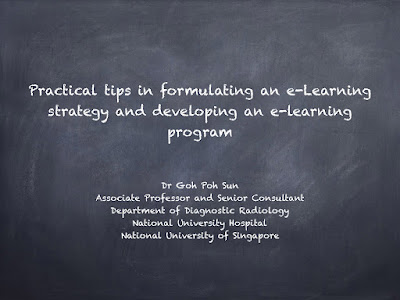




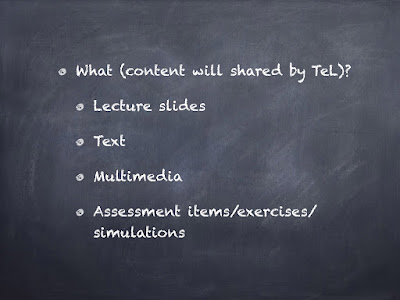

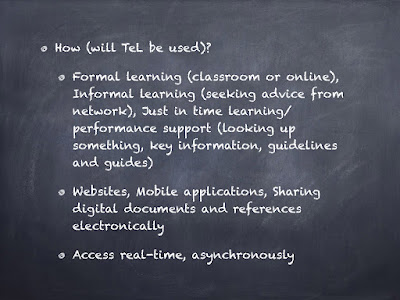
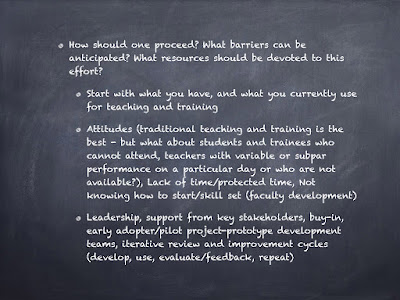
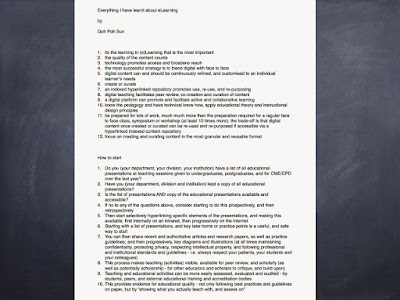

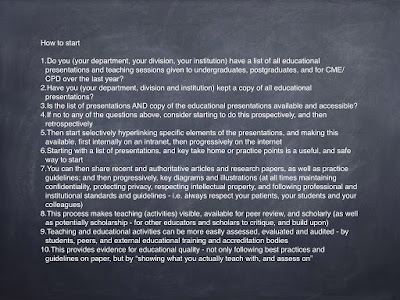




















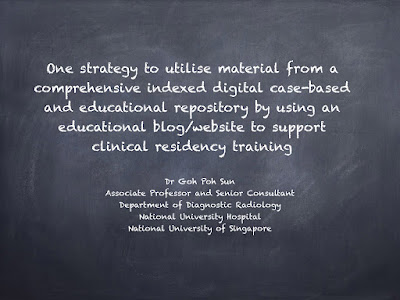
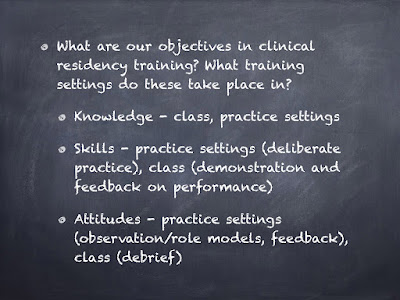
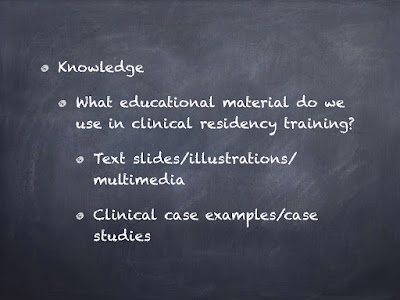






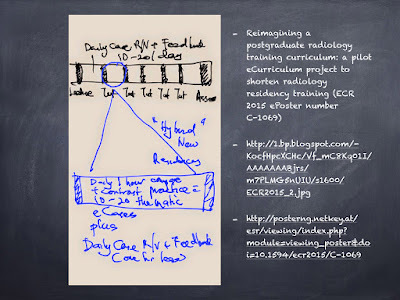
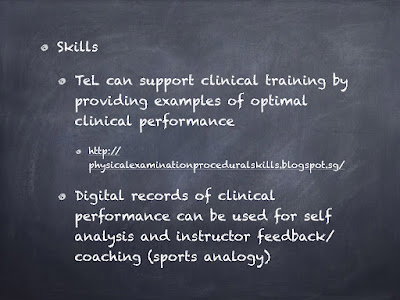
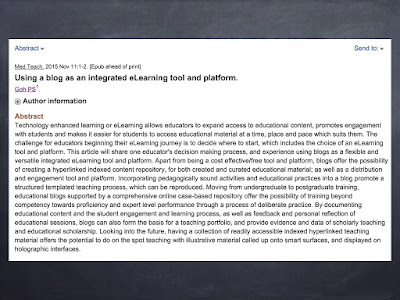

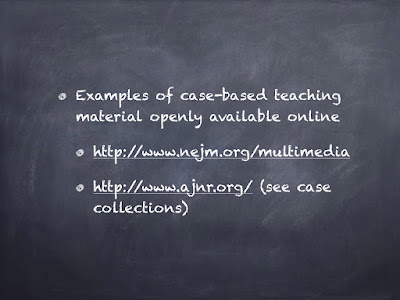








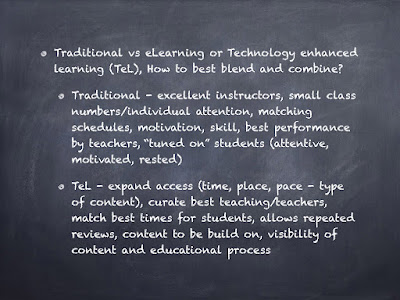
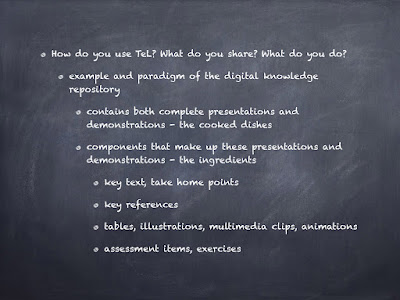
























No comments:
Post a Comment